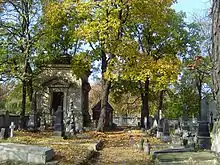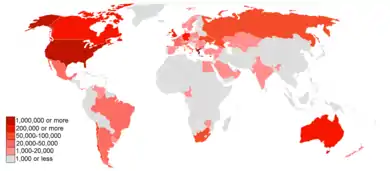Greeks in Poland
Greeks in Poland form one of the country's smaller minority groups, numbering approximately 3,600.
| Total population | |
|---|---|
| 3600 [1] | |
| Regions with significant populations | |
| Wrocław, Police i Zgorzelec, Świdnica, Ustrzyki Dolne and Bielawa. | |
| Religion | |
| Greek Orthodox Christianity | |
| Related ethnic groups | |
| Greek diaspora |
History


Greeks, particularly merchants and traders,, have been present in the Polish lands since the Middle Ages, funding a number of Orthodox churches and cemeteries throughout the Polish–Lithuanian Commonwealth. However most of these immigrants eventually assimilated into the diverse groups that trace their heritage from this polity such as Poles, Lithuanians, Belarusians, and Ukrainians.[2]
Most self-identified Greeks in Poland today trace their heritage to the large number of Greek citizens who fled as refugees from the Greek Civil War and were admitted into Poland. [3] They consisted largely of members of former communist partisan units from the Macedonia region of Greece. Most had been farmers before their flight from Greece.[4] In total, from 1949 to 1951, 12,300 people from Greece came to Poland, of whom roughly one-quarter were children.[5]
Most refugees arrived by sea through the port at Gdynia. The Polish government chose to settle them in the territories west of the Oder River near the border with East Germany, especially near Zgorzelec.[5] About 200 were also sent to Krościenko in the southeast, near the Bieszczady Mountains in a formerly ethnic Ukrainian area.[6] Initially, the refugees were celebrated as anti-capitalist heroes and given significant government assistance in building new lives and integrating in Poland.[4] Initially, they found employment on farms, for which they were well suited because of their rural background; however, they later gravitated towards urban areas.[5]
Some refugees chose to return to Greece early on.[5] By 1957, still roughly 10,000 remained in Poland.[3] However, suspicions later fell on them of being Titoist agents. A large number were deported to Bulgaria in 1961.[7] A 1985 agreement between the governments of Poland and Greece that enabled Greek refugees to receive retirement pensions at home, led to emigration back to Greece.[8]
The refugees belonged to different ethnicities, including half reportedly of Macedonian ethnicity and speaking the Macedonian language.[7] Two Polish experts in Minority Studies, Alfred F. Majewicz and Tomasz Wicherkiewicz, claim that the Polish government cooperated with Greek refugees in forcing Macedonian refugees to adopt Hellenic names, and prevented them from opening their own schools and organisations.[9]
In 1950 the refugees from Greece were organized in the Community of Political Refugees from Greece (Polish: Gmina Demokratycznych Uchodźców Politycznych z Grecji), based in Zgorzelec. Two years later it moved to Wroclaw and was renamed in 1953 Nikos Beloyannis Union of Political Refugees from Greece (Polish: Związek Uchodźców Politycznych z Grecji im. Nikosa Belojanisa).[10][11] After the fall of the dictatorship in Greece it changed its name into Association of Greeks in Poland (Polish: Towarzystwo Greków w Polsce), but in 1989, an internal schism led to the creation of the Association of Macedonians in Poland (Polish: Stowarzyszenie Macedończyków w Polsce).[11]
Minority status
In his essay, published by the Helsinki Foundation for Human Rights, professor Slawomir Lodzinski states:
At present, the full legal protection is limited to this national minorities which are groups of Polish citizens, are “old”, “native” and on non-immigrant origin. This perspective has caused that the groups of Greeks and Macedonians who have been recognized as national minorities from the 1950s, from the beginning of the 1990s are not treated as national minorities by the state.[12]
Answering a question by Brunon Synak, President of the Kashubian-Pomeranian Association, at a meeting organized by the Council of Europe in 2002, Mr. Dobiesław Rzemieniewski, Head of the National Minorities Division in the Ministry of Internal Affairs and Administration, explained that Greeks and Macedonians are "not classified as national minorities since they do not meet the requirement of being traditionally domiciled on the territory of the Republic of Poland".[13]
Notable people
References
- http://www.stat.gov.pl/cps/rde/xbcr/gus/LUD_ludnosc_stan_str_dem_spo_NSP2011.pdf
- Topolski Jerzy (red) Dzieje Poznania, tom I cz. 1 do roku 1793, Warszawa-Poznań 1988, Państwowe Wydawnictwo Naukowe ISBN 83-01-08195-3
- Gruson, Sydney (1957-02-07), "Ousted Greek Red on a Polish Visit: Markos, who led guerillas in Civil War, was believed dead or in prison; 10,000 Greeks in Poland", The New York Times, retrieved 2009-04-27
- Fleming, Michael (July 2008), "Greek 'Heroes' in the Polish People's Republic and the Geopolitics of the Cold War, 1948-1956", Nationalities Papers, 36 (3): 375–397, doi:10.1080/00905990802080596
- Wojecki, Mieczysław (1999), "Przemiany demograficzne społeczności greckiej na Ziemi Lubuskiej w latach 1953-1998/Demographics of the Greek community in Lubusz Land in the years 1953-1998", Zakorzenienie, 4 (6), retrieved 2009-04-09
- Troebst, Stefan (2003), "From Gramos Mountain towards Lower Schleszia: Refugees from the Greek Civil War in Eastern Europe and Central Asia", New Balkan Politics, 7/8, ISSN 1409-8709, archived from the original on 2011-07-22, retrieved 2009-04-27
- Yugoslavs protesting against alleged deportations of Macedonians from Poland to Bulgaria, Yugoslav Special, 1059/1061, Radio Free Europe Evaluation and Analysis Department, 1961-05-30, archived from the original on 2012-02-26, retrieved 2009-04-27
- Ambasada Grecji w Warszawie - Grecy w Polsce, www.greece.pl, retrieved 2009-06-09
- Majewicz, Alfred F.; Wicherkiewicz, Tomasz (1998), "Minority Rights Abuse in Communist Poland and Inherited Issues", Acta Slavica Iaponica, Sapporo (Japan): Slavic Research Center, 16
- Polish: Odysseas Association of Greeks in Poland
- Simoncini, Gabriele (1998), "National Minorities of Poland at the end of the Twentieth Century", The Polish Review, XLIII (2): 11–33, archived from the original on 2011-07-22, retrieved 2010-03-18
- Lodzinski, Slawomir (September 1999), The protection of national minorities in Poland, Warsaw: Helsinki Foundation for Human Rights, retrieved 16 January 2010
- Minutes of the meeting with representatives of national and ethnic minorities concerning the Report to the Secretary General of the Council of Europe on the Realisation by the Republic of Poland of the Provisions of the Framework Convention of the Council of Europe for the Protection of National Minorities (PDF), Warsaw: Council of Europe, September 3, 2002, retrieved 16 January 2010
Further reading
- Biernacka, M. (1973), "Osady uchodźców greckich w Bieszczadach/Settlements of Greek refugees in Bieszczady", Etnografia Polska (17): 83–93
- Hofman-Liandzis, K.; Pudło, K (1963), "Z badan nad kultura ludowa emigrantów greckich na Dolnym Śląsku/On the folk culture of Greek emigrants in Lower Silesia", Zeszyty Etnograficzne (1): 148–160
- Knopek, J. (2001), "Mniejszość grecka na Pomorzu Gdańskim po II wojnie światowej/The Greek Minority in Pomerania-Gdansk after World War II", in Chodubski, Andrzej; Waśkiewicz, Andrzej K. (eds.), Tożsamość kulturowa: Szkice o mniejszościach narodowych na Pomorzu Gdańskim, 1, Gdańsk: Tow. Przyjaciół Sztuki, pp. 56–63, ISBN 83-86460-47-4
- Maryański, A (1962), "Mniejszość grecka w województwie Rzeszowskim/The Greek minority in the Rzeszów region", Czasopismo geograficzne (33): 362–363
- Pudło, Kazimierz (1995), "Grecy i makedonczycy w Polsce 1948–1993: Imigracja, prezmiany i zanikanie grupy", Sprawy Narodowościowe, 4 (1): 133–151
- Środoń, Maria (December 17, 2008), Tożsamość etniczna i kulturowa Greków urodzonych w Polsce (Ethnic and cultural identity of Greeks born in Poland) (in Polish), Warsaw: Instytut Stosowanych Nauk Społecznych (Institute of Applied Social Sciences) - University of Warsaw
- Troebst, Stefan; Tutaj, Anna (2005), "Zerstrittene Gäste: Bürgerkriegsflüchtlinge aus Griechenland in Polen 1948-1998/Divided people: Civil War refugees from Greece in Poland, 1948-1998", in Bömelburg, Hans-Joachim; Troebst, Stefan (eds.), Zwangsmigrationen in Nordosteuropa im 20. Jahrhundert/Forced Migration in North-Eastern Europe in the 20th Century, Nordost-Archiv. Zeitschrift für Regionalgeschichte, 14, Lüneburg, pp. 193–225
- Pudło, Kazimierz (1999), "Uchodźcy polityczni z Grecji w Polsce/Political refugees from Greece in Poland", in Kurcz, Zbigniew (ed.), Mniejszości narodowe w Polsce/National minorities in Poland, ISBN 83-229-1550-0
- Wojecki, Mieczyslaw (1975), "Grecy w Polsce Ludowej/Greeks among the population of People's Poland", Przeglad Geograficzny, 47 (4): 763–768
- Wojecki, Mieczyslaw (1975), "Ludnosc grecko-macedonska w Polsce/Greco-Macedonian population in Poland", Czasopismo geograficzne, 46 (3): 313–314
- Wojecki, Mieczyslaw (1989), Uchodźcy polityczni z Grecji w Polsce 1948-1975/Political refugees from Greece in Poland, 1948-1975, Jelenia Gora
External links
- Bilateral relations between Greece and Poland
- Greek embassy in Warsaw
- Polish: Odysseas - Stowarzyszenie Greków w Polsce (Association of Greeks in Poland)
